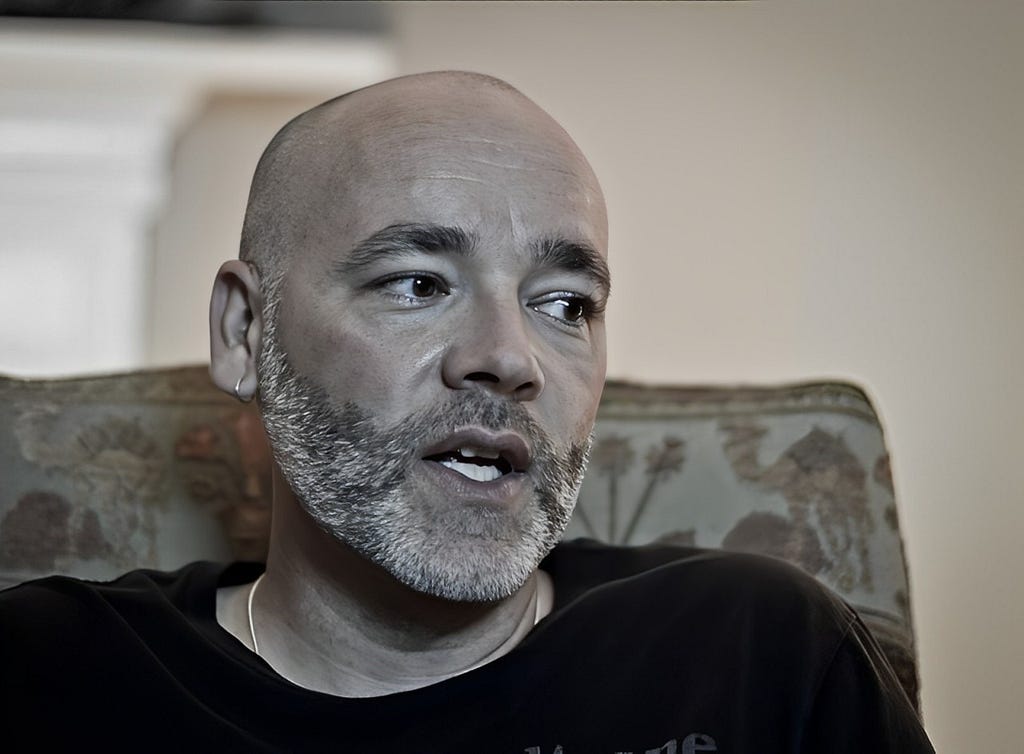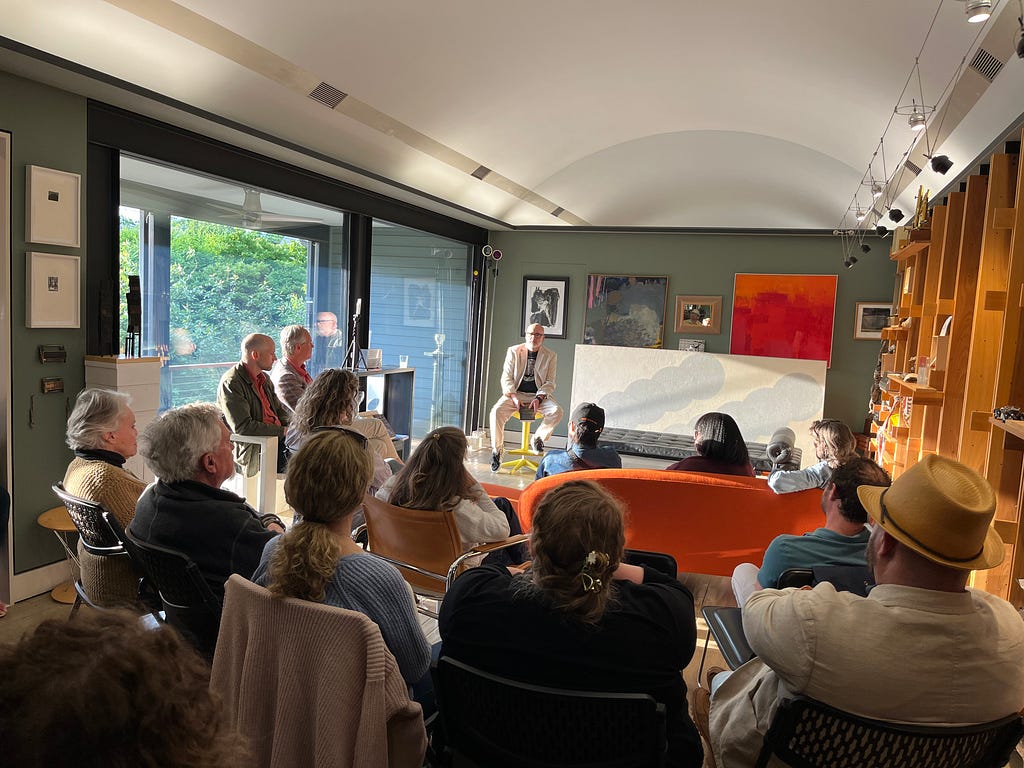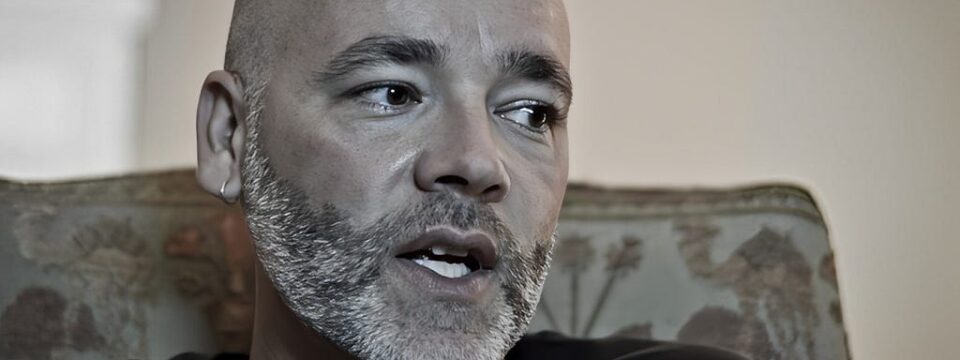
I waited tables for many years during and after college, but before that, I was a humble bus boy. The manager at the first restaurant I worked, Gene McCallister, had himself worked his way from dishwasher to line cook to general manager. He was my personal Anthony Bourdain, in that he understood the unique challenges of each role, and he treated the entire staff with respect. He also could — and occasionally did — spring into action, helping fill holes when we were short-staffed, and he was that rare, awesome boss who led by example. As an impressionable teenager, I learned life lessons from him that I’m still grateful for, today.
As part of my series about “authors who are making an important social impact”, I had the pleasure of interviewing Sean Murphy.
Sean Murphy is founder of the non-profit 1455 Lit Arts, and directs the Center for Story at Shenandoah University. He has been nominated four times for the Pushcart Prize, twice for Best of Net, and his book Please Talk about Me When I’m Gone was the winner of Memoir Magazine’s 2022 Memoir Prize. To learn more, and read his published short fiction, poetry, and criticism, please visit seanmurphy.net/ and @bullmurph.
Thank you so much for joining us in this interview series! Before we dive into the main focus of our interview, our readers would love to “get to know you” a bit better. Can you tell us a bit about your childhood backstory?
Mini milestones, or: the long and winding road toward a writing life. There’s the first stories I wrote: fifth grade; vaguely plagiarized ones where, looking back and with apologies to Edgar Allan Poe, imitation was the sincerest form of flattery. There’s the first success. (Being asked to compose and recite an original poem for an eighth-grade student assembly.) There’s the first readership. (A series of features I wrote for my high school newspaper. For a teenager, a printed byline is as close to the big-time as it got, at least in the old-school era before social media and blogs.) There’s the first publication. (A poem in my college literary magazine.) There’s the first “important” publication. (A short story in another, better-known literary magazine.) There’s the first in a longer series of ceaseless rejection. (No comment necessary.) At this point, most writers recognize the only way forward is to get better, and be in it for the long haul.
When you were younger, was there a book that you read that inspired you to take action or changed your life? Can you share a story about that?
Yes! It was the first “adult” book I read: Mary Shelley’s Frankenstein, fourth grade. Huge mistake. Having seen the movies and read some comic book treatments, I thought I was ready for the real thing. It took me more than halfway through to understand Frankenstein was not, in fact, the monster. I learned that I wasn’t quite prepared, but the desire to read “real” books considerably accelerated my learning curve.
It has been said that our mistakes can be our greatest teachers. Can you share a story about the funniest mistake you made when you were first starting? Can you tell us what lesson you learned from that?
In my mid 20’s, a friend of a friend found out I wrote fiction and boasted that he had John Updike’s mailing address. Considering this a signal that Fate was on my side, I sent him a nice note with some short stories. His terse, humbling reply (a typed postcard that simply said “having my address is not a short cut to finding editors who believe in your work.” He was, of course, correct, and it was a humbling reminder that rich or famous connections are no substitute for quality work.
Can you describe how you aim to make a significant social impact with your book?
This Kind of Man seeks to pose a rhetorical question: how much of the anger and miscommunication that prevails in America is the result of an outdated and dysfunctional notion of masculinity? How does not being taught to communicate openly or honestly, or show vulnerability, or cultivate empathy result in an inevitable feeling of alienation, loneliness, and despair? By looking honestly at these questions, we might establish some positive dialogue that could lead to changes our typical political discourse is not facilitating.
Can you share with us the most interesting story that you shared in your book?
This collection is definitely not thinly veiled autobiography, but most fiction is inspired by true stories, or something the writer has heard or seen. In the case of the story “Winning,” I describe a father-son dynamic that is the exact opposite of my own. My dad is very much an “old school” type, but growing up, he would not tolerate poor sportsmanship, or bullying, and his Boston-Irish sensibility instilled in me an appreciation for the underdog. As such, I not only had a role model of positive masculinity, but can appreciate the ways less savory examples (from our fathers, teachers, coaches) lead to the types of toxicity I depict throughout my book.
What was the “aha moment” or series of events that made you decide to bring your message to the greater world? Can you share a story about that?
Before I was a writer, I was an avid reader. As someone whose life was profoundly impacted by the arts, I understood, early on, that creativity can provide insight, connections, and the aspiration to transcend our circumstances. Having personally been affected by the poetry, journalism, and fiction I’ve read, I believe writing has the magical power of reminding us that all barriers (cultural, language, historical) are less significant than our shared humanity. Some of the characters in my book represent the kinds of men who likely won’t (or can’t) tell their own stories, but I am convinced their stories need to be told, with curiosity, empathy, and respect.
Without sharing specific names, can you tell us a story about a particular individual who was impacted or helped by your cause?
Yes! I was at a reading event just last week, and a person approached me after and thanked me for writing a book that would help him talk to his own father. He admitted that he simply could not discuss politics or religion (and how many of us, especially in 2024, can relate to this?) with his dad, but he felt if his father read my book, it would provide an incentive, a sort of delivery device for the kinds of conversations they’ve never been able to have. This is precisely the type of response I hope my book can encourage; if anything I’ve written can help establish connection or prompt a more positive discussion, that’s the best outcome — and something I’d be gratified and humbled to play a small part in facilitating.
Are there three things the community/society/politicians can do to help you address the root of the problem you are trying to solve?
Yes! I not only write, but run a non-profit and direct a college program that focus on the power of storytelling. I believe sharing stories is the most effective way for human beings to feel heard, which leads to respect and compassion. So much of what we’re lacking today comes from a zero-sum game where one person or party has to “win” at all costs, and there’s no room for compromise. I think this carries over to the pathology of late-stage capitalism where we idly watch CEOs make millions (or billions!) while using a fixed system to avoid taxes while hard-working Americans have few exceptions or excuses — this breeds anger and a sense of injustice. I also think, while we’ve made significant strides, we still have a long way to go in terms of making our country a place where one’s sex, race, or status does not preclude them from living their best life. Instead of the backward and embarrassing move to ban books, we should be celebrating the ways art challenges and inspires us.
How do you define “Leadership”? Can you explain what you mean or give an example?
It’s a bit of a cliché, but I believe the best leaders don’t ask anyone to do anything they won’t do themselves. We live in an era where the wealthiest amongst us often obsessively work to further enrich themselves (or expand their “brands”); the exceedingly rare examples of leaders like José Andrés or MacKenzie Scott who actively use their influence to lift up others are the role models we need to celebrate and imitate.

What are your “5 things I wish someone told me when I first started” and why? Please share a story or example for each.
If it’s okay, I’m going to flip the script and give five examples of people who helped guide my journey and without whom I may have been insufficiently prepared.
- I waited tables for many years during and after college, but before that, I was a humble bus boy. The manager at the first restaurant I worked, Gene McCallister, had himself worked his way from dishwasher to line cook to general manager. He was my personal Anthony Bourdain, in that he understood the unique challenges of each role, and he treated the entire staff with respect. He also could — and occasionally did — spring into action, helping fill holes when we were short-staffed, and he was that rare, awesome boss who led by example. As an impressionable teenager, I learned life lessons from him that I’m still grateful for, today.
- My fifth-grade teacher, John Taliaferro, introduced me to journal writing — and I credit this simple, profound experience (along with his encouragement when I began to write derivative short “horror” stories) as helping set me on a path I still happily find myself on, today.
- My high school journalism teacher, Chuck Cascio, in addition to being a stellar role model and instructor, gave me some tough love advice, way back in 1988, making sure I understood that a life in news media (or writing of any kind) was tenuous, not especially well-paid, and fraught with setbacks. This may sound like discouraging advice, but it was the type of clear-eyed, honest insight that allows young idealists to know what they might be getting into, and to approach their dreams with a measure of realism and mature expectations.
- Similarly, my grad school professor and thesis advisor Devon Hodges managed to simultaneously convey that I was one of her better students and that, unfortunately, I may not have been cut out for a life in academia. It wasn’t because I couldn’t handle the workload or lacked the skills, but rather, I was unable (and unwilling) to narrow my focus and pick one specific area of expertise. To me, fitting one’s academic passion into a marketable bucket seemed paradoxical to intellectual freedom. As it turned out, my genuine, if impractical attitude helped me immeasurably as a writer, and I was able to scratch many itches via critical essays and book, movies, and music criticism.
- I was audacious enough to send the great Pat Conroy a sample of my novel-in-progress, and he was kind enough to call me to offer encouragement (and a blurb for the finished product, which still remains unpublished, more than 20 years later — an apt enough metaphor for the writer’s life). Among the many sweet things he told me, he made it clear that all successful writers treat their gifts with a sort of humility and awe, and it’s truly a life’s work — advice that was true then, and remains true, today.
Can you please give us your favorite “Life Lesson Quote”? Can you share how that was relevant to you in your life?
I seize any opportunity to invoke George Orwell, a writer whose influence has been indescribably positive. In his immortal essay “Why I Write” he states “the opinion that art should have nothing to do with politics is itself a political attitude.” He is not only correct, but this single sentence illustrates the way he was able to succinctly articulate the deepest truths. I’ve kept this quote in mind throughout my writing life, and it serves as both guide and inspiration for remembering that the purpose of art is to elucidate, to convince, to connect.
Is there a person in the world, or in the US with whom you would like to have a private breakfast or lunch with, and why? He or she might just see this, especially if we tag them. 🙂
Without question I would love to spend a minute or two with Stephen King; not only would I relish the opportunity to express my gratitude, but speak for countless writers who owe him a debt: for writers of my generation, he was our Beatles, our president, our pope; he proved magic is real, and if you’re willing to honor your ability, you can change the world.
How can our readers further follow your work online?
I invite anyone to sample my writing at seanmurphy.net, read my real-time takes at bullmurph.com, and connect on social @bullmurph.
This was very meaningful, thank you so much. We wish you only continued success on your great work!
Social Impact Authors: How & Why Author Sean Murphy Is Helping To Change Our World was originally published in Authority Magazine on Medium, where people are continuing the conversation by highlighting and responding to this story.
